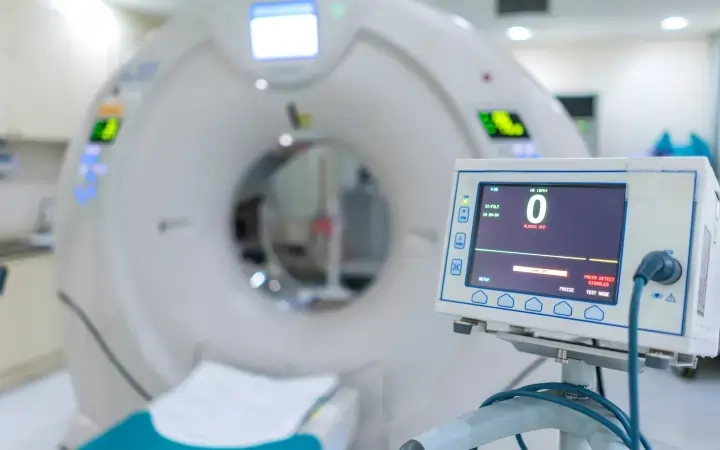Cardiac Radiology Services
At AMI, our team of highly specialized radiologists deliver screening and diagnostic support with state-of-the-art imaging modalities, advanced technology and the expertise necessary to improve heart health.
Cardiac imaging subspecialists at Aster Medical Imaging (AMI) use cardiac computed tomography (CT), nuclear medicine, and cardiac magnetic resonance imaging (MRI) to diagnose and treat heart disease. The cardiac radiologists at our cardiac radiology department superimpose views of the heart from two disparate studies, leading to sharper and more precise images for accurate diagnoses.
AMI’s Cardiac CT Services Include:
- Coronary CT Angiography
- Coronary Calcium Scoring
- Pulmonary Vein Mapping
- Transcatheter Aortic Valve Replacement (TAVR)
- AMI’s Cardiac MRI Radiology Services Include:
- Evaluation of heart structure and wall motion
- Abnormal Rhythm: Arrhythmogenic right ventricular cardiomyopathy
- Heart Inflammation: Myocarditis and Amyloidosis
- Heart tumors
- Origins of abnormal coronary artery
- Tetralogy of Fallot follow-up

What do we Offer at AMI?
How Cardiac Radiology Imaging Reporting Can Improve Your Throughput Using Our Services
Quality
Reporting standards followed as per guidelines from the American College of Radiology (ACR) & The Royal College of Radiologists (RCR)
On-Time Reports
Reliable, and accurate reports with less turn-around time. 99% of the emergency reports are delivered in less than 1 hour.
24/7 Compliance
Internationally certified radiologists with Sub-specialty expertise are available 24×7 for 365 days a year.
FAQs
Radiological investigations of the heart play a crucial role in diagnosing and managing cardiovascular conditions. One of the primary modalities used for cardiac imaging is X-ray, which provides detailed images of the heart's size, shape, and position within the chest. X-ray examinations, such as chest radiography, help identify structural abnormalities, assess the condition of the lungs, and detect issues like heart enlargement or fluid accumulation. Another common radiological technique for cardiac evaluation is Computed Tomography (CT) angiography, which produces detailed cross-sectional images of the heart and blood vessels. CT angiography is valuable for assessing coronary artery disease, detecting vascular abnormalities, and evaluating cardiac anatomy. Magnetic Resonance Imaging (MRI) is another powerful tool for cardiac imaging, offering detailed images of the heart's structure and function without the use of ionizing radiation. Cardiac MRI is particularly useful for assessing myocardial viability, cardiac function, and identifying structural anomalies. Additionally, echocardiography, although primarily an ultrasound-based technique, is an essential non-invasive imaging modality for evaluating heart function and identifying structural abnormalities in real-time. These radiological investigations collectively contribute to a comprehensive assessment of cardiac health, aiding clinicians in making accurate diagnoses and formulating effective treatment plans for cardiovascular conditions.
The most common radiological investigation is X-ray imaging, a widely employed diagnostic tool that provides valuable insights into various medical conditions. X-rays use ionizing radiation to create images of the internal structures of the body, primarily bones and certain soft tissues. This imaging modality is quick, cost-effective, and readily available, making it a first-line investigation for a variety of medical scenarios. Chest X-rays are routinely performed to assess lung conditions, heart size, and rib abnormalities. In musculoskeletal imaging, X-rays help identify fractures, joint dislocations, and bone deformities. Dental X-rays aid in evaluating oral health, while abdominal X-rays can reveal issues in the digestive system. Despite its widespread use, X-ray imaging is limited in providing detailed information about soft tissues, prompting the use of other modalities like CT scans or MRI for more comprehensive evaluations. Nonetheless, X-rays remain an essential and foundational tool in the diagnostic armamentarium due to their accessibility, speed, and effectiveness in revealing structural abnormalities.
No, an electrocardiogram (ECG or EKG) is not a radiology test. ECG is a non-invasive diagnostic test that measures the electrical activity of the heart. It records the electrical impulses generated by the heart as it beats, providing information about the heart's rhythm and rate. Unlike radiology tests, such as X-rays, CT scans, or MRIs, which use imaging technologies to visualize internal structures of the body, an ECG relies on electrodes placed on the skin to detect and record the electrical signals produced by the heart. ECG is commonly used in cardiology to assess heart function, identify irregularities in heart rhythm, and diagnose various cardiac conditions, but it does not involve the use of radiation or imaging modalities typically associated with radiology.

AMI Expertise - When You Need It, Where You Need It.
Partner With Us

